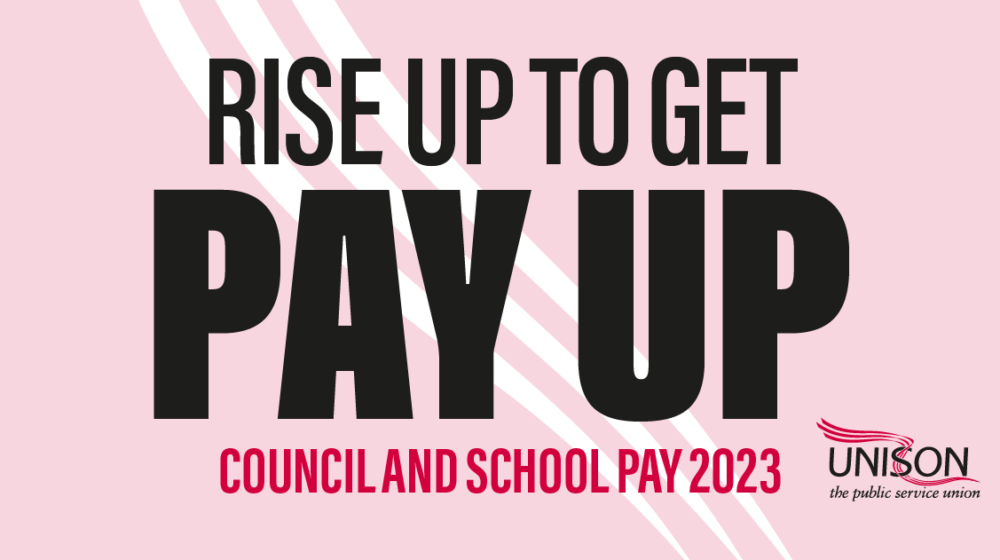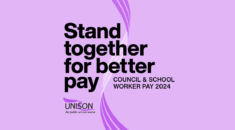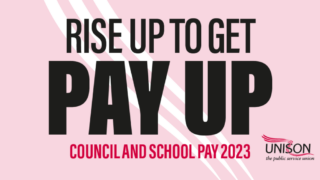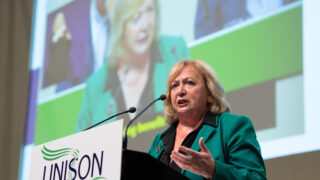Sean Fox. Image: Marcus Rose
On 23 May, the ballot opens that invites UNISON’s 370,000 local government and schools members to vote on whether to take industrial action over the employers’ pay offer.
The joint union pay claim for 2023/24 was for 12.7%. This was based on the government’s own inflation projection for the coming months, plus 2%, to begin the process of catching up after years of below-inflation pay increases.
The offer that came back was a flat offer of £1,925, which amounts to roughly 9% for the lowest-paid, and lower percentages as you go up the pay spine. For school employees on term-time contracts, this offer will work out to be considerably less.
Sean Fox is joint branch secretary of Haringey Local Government in London, and chair of the union’s NJC committee, which oversees decisions on local government pay in England, Wales and Northern Ireland. Here, Sean offers reasons why members should vote ‘yes’ in the upcoming ballot.
The falling value of our pay
To use a phrase that I often hear from members: ‘There’s a lot of month left when the money runs out’. We’ve been falling behind on pay for years. We’ve had pay rises that haven’t matched inflation in eight of the last 10 pay rounds. The best way I can describe our situation, at the moment, is that people are working one day for free every week, if they work full time. Their pay has dropped by around 20% in a decade, in real terms. And with this pay offer it will continue to drop.
The offer might look good on paper – but it isn’t, because it doesn’t meet inflation for anybody. It’s a pay cut in real terms for every single member. Even if the employer had said, ‘Okay, we’ll pay you exactly what you want’, we’d still be 18% worse off, because we’re trying to catch up with money we’ve already lost.
The cost of living crisis
Local government in the main isn’t a particularly well-paid sector. And for most of our members, the reality of the cost of living crisis is insane.
I’ve seen from my own branch that the number of people who are applying for help to UNISON’s welfare charity, There for You, has shot up. The use of food banks and other support networks has gone up too. And this goes a lot further up the range of jobs than people would expect. At the same time, if you’re buying a house, your mortgage rates have gone up. If you heat your house, or you try to, your electricity and gas have gone up. All of these things have gone up by far more than our pay has.
One member told me, ‘If they gave me this pay rise, it would effectively get eaten up by the electricity cap’. It’s that mad.
Services are suffering too
Pay is obviously the bottom line for our members, but they do care about what they do, they care about services being stretched and cut. And local government services have been cut to the bone for a decade or more. There is nothing left to cut.
You hear so many stories of our members stepping in, using their own initiative, and spending their own money to fill the gaps. For example, school staff taking in pens, pencils, things like that, because budgets have been cut and they don’t want to see children do without.
So we’re starting to lose staff across the country, particularly at the bottom end, because there are jobs that pay better, in retail for example. I looked at a job in Aldi the other day, they were paying more than some local authorities are paying. And that’s no disrespect to people working in retail, because they’re important, but the idea that you can earn more working in a supermarket than dealing with vulnerable children is just wrong.
As well as retention, there are recruitment problems. We’ve always had problems for certain jobs – social workers and planners have always been a premium, those sorts of jobs where there are private sector places people can go and work for more money. But now, it goes a lot further down the line. So, you get schools struggling to recruit teaching assistants, because they’re being asked to do more, for less.
There needs to be more money in local government to fund decent services and to invest in the people who run those services, with proper pay, training and development. When we put the pay claim in, we were very clear to the employers that we want to work with them – to make the argument to central government for more investment.

Central government can afford it
Over half the cost of meeting our pay claim would be recouped by the government in increased tax and national insurance from the improved wages. And it’s not just that. Lots of our members are claiming in-work benefits. They claim Universal Credit, even though they’re working, to top up their income. So of course, if their wages go up, the amount central government pays in top up and other benefits goes down.
Better pay benefits the economy
If you take the area I work in, that would absolutely be the case, because the council is one of the biggest employers – we spend our money in the local shops, we spend our money on local services. And if you look at most high streets, you can see the impact of the cost of living crisis because people aren’t shopping. So it would absolutely generate income and, in turn, generate more jobs.
We need to stand up
We haven’t had a dispute about pay for several years. If there was ever a time to stand up, if there was ever a time to actually say, ‘No, we can no longer do this’, it’s now. It’s about survival – for our members and for the services they provide.
We need to show that public services, and public service workers, matter. Everyone was quite happy to say how marvellous we were during the pandemic. But our members deserve more than being patted on the head. They deserve to be able to live and enjoy their quality of life. And they can’t.
Some will say they can’t afford to go on strike. I appreciate that. It’s not an easy decision to make. No-one chooses to do it. But we have no choice. Because if we don’t, we’ll just keep getting offers like this, and our pay will keep getting stretched and depreciated.
The public is with us
Even if the Westminster government doesn’t appreciate local government, I think the public does, because they have seen everything we do for communities. We see the public support we have when we talk to parents and carers, for example, who are using particular frontline services.
The public understands why we’re balloting for strike action. They understand that they don’t see pickets every day, that it’s something that happens periodically when people can no longer sustain themselves.
They understand that people don’t go on strike because they want to, but because they have to.
If we call on the public to support us, they will. And clearly they’ve got a role to play in lobbying – primarily their MPs, but also their local councils, in turn, to lobby government.
It’s the only way
We’ve had no meaningful negotiations this year. That’s the reality. This is my fourth pay round, as chair, but I’ve been around longer. In the past, you would sit down, they would make you an offer, you would go away and consider it, you come back, you talk about it. This time, they didn’t even meet us until they made the offer. They wrote us a letter and said, ‘This is our offer’.
And they have absolutely refused to open negotiations. They said they can’t offer a penny more, never mind the significant improvement we’re asking for. My assumption is they simply think people will take this offer. But we’re not prepared to go to members and ask them to consider an offer that’s just not going to meet their needs, an offer that falls so far below the rising cost of living. That’s why we’re going straight for a ballot for action – it will send a clear message to the employers and the government that they need to pay local government and school staff the decent wages that they deserve.
I’m quite clear the only way they’ll come back and talk is if we deliver a mandate that says we’re prepared to take strike action. We may never have to picket. It’s leverage, basically, to get back round the table. The employers need to know that their staff are annoyed enough and desperate enough to take that action.
This is the message my committee wants to get to the members: if they’ll place their trust in us and vote in the way we need them to, we can then use that trust to kick down the employers’ doors.







I’ll be voting to reject the pay offer, as it is yet again effectively a pay cut, and hits all the harder in the current “cost of living crisis” engineered by a corrupt Tory Government and their paymasters/sponsors in the energy and oil industry who are creaming off billions in profits………
Good strong words Sean,but as you said people can’t afford to strike.The truth is though we can’t afford Not to Strike.
Will there be a strike fund available as there was for the nurses?
I will be joining Unison so that I have a voice, as I don’t with my current union. I work as a school business manager, received 3.46% pay rise last year and the current proposal is 3.88% rise this year – it is completely unacceptable, massively under inflation and a real-terms pay cut. I will receive the lowest % increase (by far!) across the entire staffing of the school for the second year running.
After paying all my bills and feeding my children I am left will £45 for the rest of the month. This is not enough to live let alone survive.
I reject the pay offer. It is an insult.
I thought this career will be able to put food on my table. Unfortunately I’m struggling to pay my bills and put food on my table as a single hard working woman.
I am a care worker and we’ve not even had the opportunity to talk and negotiate it feels. Our wages are still at an all time low. I feel that if living wage is higher then minimum wage. Why aren’t all puplic and private companies forced
to pay at least living wage why is living wage a usp for some companies and a apprantly a privallage. What is wrong with that
I’m considering signing up so I can vote to reject the pay offer, I’m fortunate to be near the top of the NJC pay spine and am tired of the spine being eroded by the deleting of lower pay scales (due to below inflation increases) and equal monetary value pay offer’s, if this continue’s, there will come a time where being a supervisor or senior leader is no longer worth the stress!
I will be rejecting the pay offer.
I am a recently devorced home owner trying to pay my mortgage and meet all the other bills.. Times are hard and will only get worse .
25/05/23 I agree with John. When does this end, enough is enough. I do not take strike action lightly yet it seems the only way to get your voice heard. If the public back us then we have a duty to join together as one voice.
That did answer my questions about why we didn’t vote on the offer and the funding. Thanks for putting this together.
I also agree support staff should get pay rise
I work for academy trust school and the pay seems to be too low compared to other administrative jobs similar to my job roll , enough is enough we need to stand up now big bosses get handsome pay rise every year and we back office people are not noticed!
I am a care worker and I have observed that we are supporting different communities in the UK and we do not have the opportunity to talk and negotiate our pay scale. Our wages are very low compared to our role with other NHS Staff. Due to high inflation, it seems it is wrong to pay us a low hourly rate to meet our day-to-day needs.
We have no choice. While the government give billions of pounds in tax breaks to the richest, public servants are using food banks! Enough is enough- we can’t afford not to strike!
It is laughable, I reject the pay offer!
For me as a key worker i cant afford to strike without pay
I think we support staff work just as hard as teachers. Pay up!!!
I am a retired School Site Manager and always felt undervalued and underpai
Time to Payup.
I am retired workshop Technihan pay up for there services
I I am Higher Level Teaching Assistant and I think I work just as hard especially that I have to cover all the different classes and cover Teacher absences. Pay Up
Pay up because I am learning support assistant for deaf school and work in different classes and doing medicines for some students and also work at boarding school after school I work hard than teachers! Pay up please.